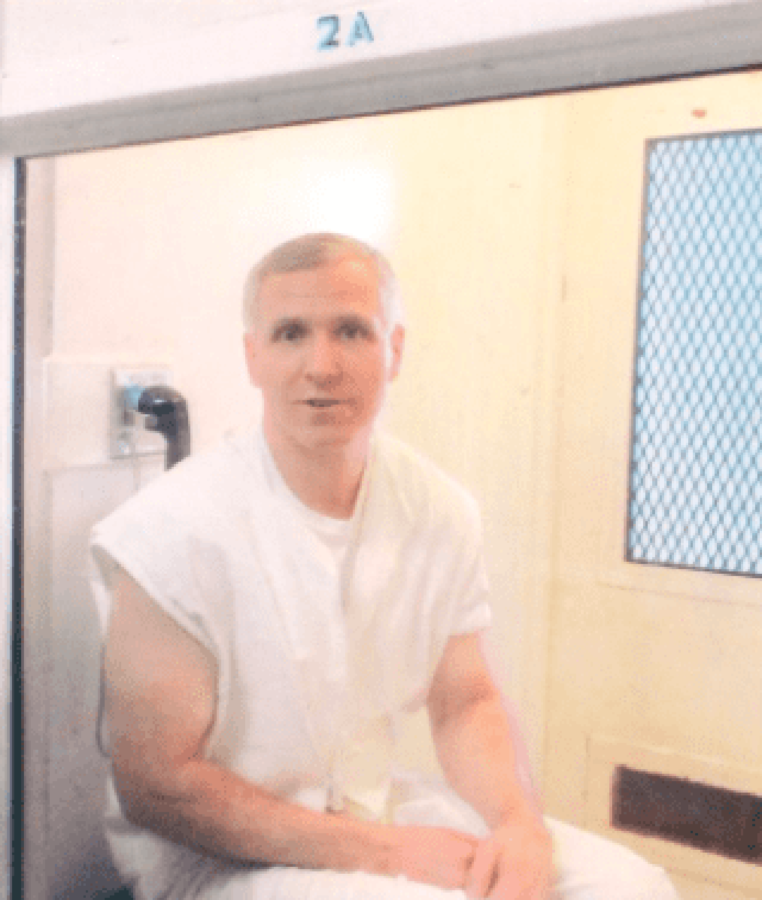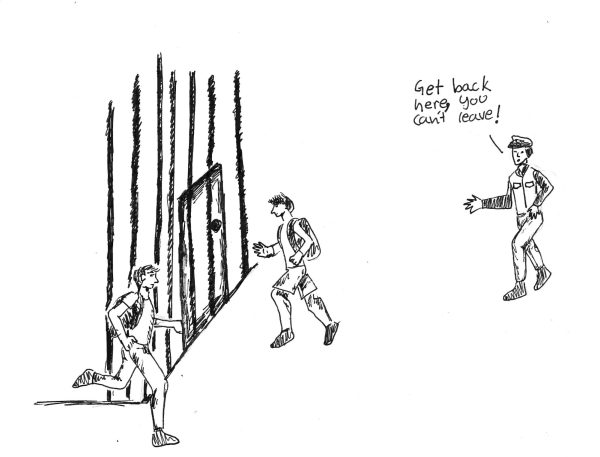The Dennis Hope Case: When solitary confinement becomes cruel and unusual punishment
In 1994, Dennis Hope was deemed an escape risk from his Texas maximum security prison, and for the next 27 years, he was in near total solitude in a 54 square foot cell for 23 hours per day. He was without human contact aside from the brief periods of contact with his guards, when he was escorted from his cell to an area where he could exercise for one hour, only to be returned to his cell to be alone for another 23 hours. This cycle continued for 27 years, meaning that Dennis Hope was completely and totally alone 95% of the time from the years of 1994 to 2021.
Hope had been sentenced to 80 years in prison in 1991 for a series of aggravated robberies with a deadly weapon, and in 1994 he broke out of his prison and resumed his crime spree, only to be apprehended again and sentenced to solitary confinement. In 2005 Hope was found to no longer be an escape risk, but was not released from his solitary confinement to join the rest of the general prison population for no apparent reason. After being removed from solitary confinement in 2022, Hope elevated his case as an 8th Amendment violation all the way to the Supreme Court, which ultimately made the mistake of refusing to hear him.
In 2018 Hope’s lawyer filed a civil rights lawsuit against the prison officials, claiming that his treatment violated his 8th Amendment right, which states that “Excessive bail shall not be required, nor excessive fines imposed, nor cruel and unusual punishments inflicted.” This claim was dismissed by a federal judge in Texas in 2020, and again in 2021 by the 5th Circuit Court of Appeals, both of whom stated that Hope’s treatment “Did not rise to the level of an 8th Amendment violation.” In a final effort, Hope’s lawyer Easha Anand elevated the matter to the Supreme Court, who declined to hear the case, further backing the claim of Hope’s treatment not qualifying as “cruel or unusual.”
According to a study from Yale Law School in 2019, there are approximately 7,000 people in the US who have been placed in solitary confinement for over one year, 1,500 of which have been in solitary confinement for more than six years, showing that while Dennis Hope’s 27 years in solitary confinement is certainly an outlier, it is not completely unique. The effects of this confinement are obvious in Hope, whose eyesight and vocal chords have weakened from lack of use, and whose vocabulary has shrunk in the 27 years of his confinement due to being almost totally alone for such a long period of time. Hope said he suffered “bouts of anxiety, depression, hallucinations and thoughts of suicide while being denied treatment,” something that clearly stemmed from his confinement, according to his lawsuit.
Dennis Hope is not a good person. His crimes were violent and put the lives of innocent others at risk. But no human deserves the treatment he received, and all Americans are guaranteed a certain level of humanity in the treatment they receive from the government thanks to the 8th Amendment. The Supreme Court’s decision not to hear his case and to uphold the lower court’s ruling sets a dangerous precedent for what constitutes cruel and unusual, because if 27 years almost completely alone does not warrant cruelty, then nothing does. The Supreme court should have heard and ruled in favor of Dennis Hope.
Humans are naturally social creatures, and it has been a deeply ingrained instinct to seek out and interact with other humans since the days of hunter gatherer tribes. It is therefore a simple conclusion that denying an individual the right to fulfill this instinct would have the same negative effects of denying any other natural human instinct, such as the urge to swim while drowning, to eat when hungry, and so many others. While natural death may not come from a lack of socialization, it is still a human need, as shown in the profound effects on Hope, who had extreme anxiety, hallucinations, and even suicidal thoughts as a result of his confinement. No human should be subject to this treatment, and certainly no human supposedly guaranteed exemption from cruel and unusual treatment.
In the current US system, prison is a place to punish people for crimes that they have been convicted of, but that punishment is not without limit. Typically the term “Cruel and Unusual” is used to describe literal torture at the hands of the government, but it does not have a specific definition in the eyes of the law, meaning that it is unique on a case to case basis. It seems clear that in a world where the vast majority of people have not spent much more than one day completely alone, 27 years of almost total isolation would certainly qualify as cruel if not inhumane, as not only did this confinement have negative physical effects on Hope the same way that torture would, it also had severe mental health consequences. The 8th Amendment gives the same protections for everyone, including convicted criminals, no matter how great their crimes, and if it guarantees protection from torture, it should also guarantee protection from the treatment Dennis Hope received.
Some supporters of the Supreme Court’s decision may claim that Dennis Hope’s treatment was not for the sake of his punishment, but for the health and safety of the other prisoners around him and therefore not part of his punishment, but this is a fundamental misunderstanding of the case. Not only was Hope placed in solitary confinement for a completely different reason ( It was feared he would escape again ), but the practice of solitary confinement for the sake of safety must follow the same rules of any state of confinement. When people are sentenced to jail time, they are almost always sentenced to a set amount of time, with the exception of life in jail, which is what Hope was sentenced to. The difference between being sentenced to life in prison and life in solitary confinement, however is that the general prison population was built for people to live in, while solitary confinement is a short term punishment for further bad behavior while already in the prison with the promise of eventual reintegration, meaning it is not acceptable for Dennis Hope to have been placed in solitary confinement for so long, particularly after he was no longer deemed an escape risk.
Overall, Dennis Hope was denied his right not only to cruel and usual punishments, but also the right to have his case heard at the highest level, something that he should have been guaranteed in a case so nuanced. This decision not to at least hear Hope’s case sets a dangerous new precedent at the highest level that will only serve to elevate the prison industrial conflict that has resulted in the US having the most incarcerations per capita.
Sources
https://law.yale.edu/sites/default/files/area/center/liman/document/time-in-cell_2019.pdf
https://www.reuters.com/world/us/us-supreme-court-turns-away-suit-by-texas-inmate-held-27-years-solitary-2023-04-17/
I mainly write stories about local government, such as the Cleveland Yondr pouch policy or the PPS budget deficit, but the story I most enjoyed writing...








Colleen S Peterson • Feb 7, 2024 at 8:16 PM
I used to write to Dennis. I knew I had nothing to worry about considering he thought he’d never get out of confinement. I don’t worry to this day. I’m not even sure what made me think about him tonight. He helped me through a period of my life that wasn’t so pleasant. (but he was) I think I’ll write him a letter to ask how he’s doing. Maybe he’ll draw me another beautiful picture. Man of many talents, some not so good and some are wonderful. He was very taken back when I 1st wrote him and thought I was part of some local newspaper wanting information from him. I could see where that could of been a problem. Once he knew I was just making conversation, he was fine. I’m definitely going to write to him again.
Justin Vanhorn • Jan 5, 2024 at 7:37 AM
Nope. This criminal led to the death of my great grandfather. He held up an 84 year old man as he was leaving the gas station and stabbed him 3 times and left him on the side of the road. He passed 3 months later due to stress on his heart after the incident. My great grandmother passed 3 months after that. He should have been put to death a long time ago. He lost his rights when he chose rob steal and kill. His choice.
Ashleigh Gerbers • Aug 31, 2023 at 8:11 PM
A lot of questions raised. If he was deemed not to be at risk for escape after 11 years of confinement, why is he still in there? That makes the greatest point in his case. The “punishment is disproportionate to the crime” – I agree with that, given that he was no longer at risk. I believe it does violate the 8th amendment. Andrew Weir studied the top things that attributed to longevity (living a long life) and among the top 3 was social connectivity. People actually do die sooner from not having social connections.
Ali Starrs • Feb 14, 2024 at 10:17 PM
I am a 37 year old female. I lost a sibling years ago at the hands of another. I know how that feels. However, had my brother’s killer been confined such as Mr. Hope I would be the first one to stand on his side because he is a human, people make horrible mistakes! This is not a punishment-this IS torture! I’m much more concerned with a rapist being set free after minimal time served or a serial killer being set free due to a “technicality” than I am concerned with Mr. Hope escaping and returning to a life of crime. He should be compensated and let go-THIS is an injustice, THIS is inhumane, THIS is UNGODLY, and THIS is an embarrassment! Shame on you Texas! Where’s the petition?
John kingangi • Jul 1, 2023 at 10:14 AM
Dennis hope deserve to be treated like a human being. This is really unfair ??, been in solitary confinement for 27yrs?? He deserves justice and alot of apologies from authority.
Michele Asgian • Jun 27, 2023 at 7:01 PM
The USA is constantly assessing human rights around the world and holding those nations accountable for what it deems as violations of human rights. This is a clear example of us ignoring what’s going on in our own backyard. If 27 years of solitary confinement doesn’t equate to cruel and unusual punishment, what exactly is the yardstick we are using? Let’s also remember that while his crimes put people in danger, no one was ever hurt. Yes he is a life long criminal with a record that does not give much hope of rehabilitation, yet Charles Manson and Jeffery Dahmer were treated with much more humanity. I won’t ever understand how this was allowed for 27 years.